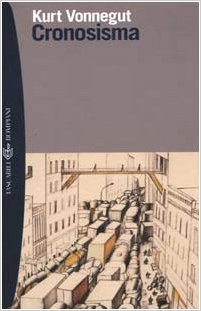What do you think?
Rate this book


219 pages, Paperback
First published September 22, 1997



“Extenuating circumstance to be mentioned on Judgment Day: We never asked to be born in the first place.”The universe happened upon the same question that hits us all, often for no particular reason and out of nowhere: What the hell am I supposed to do with myself? Do I continue expanding or do I quit and start over? In its understandable confusion and crisis it shrinks a bit and sends everyone back 10 years, forcing everyone to relive every moment, fully aware of having done it all before, but incapable of changing anything.
“’The main thing about van Gogh and me,’ said Trout, ‘is that he painted pictures that astonished him with their importance, even though nobody else thought they were worth a damn and I write stories that astonish me, even though nobody else thinks they’re worth a damn. How lucky can you get?’”The Timequake, however, plays a small role in the book. It is the frame, yes, the story we return to, but mostly this is a collection of stories from Vonnegut’s life and Kilgore Trout’s arsenal of oddball short stories. With his usual wit and round-a-bout way of saying anything, Vonnegut dishes up some striking social commentary. I’m continuously surprised by how achingly humane he is, making his observations all the more salient, because they come from a place of compassion and honesty.
“I guess that everyone includes meIf anyone, Vonnegut embodies that saying, at least in this particular book.
and that’s why I’m a humanist”
"There is no way a beautiful woman can live up to what she looks like for any appreciable length of time."

State a sentire: siamo sulla terra per cazzeggiare. Non credete a quelli che vi dicono che non è così!
Le donne sono tutte psicotiche. Gli uomini sono tutti coglioni.
"Ancora e per sempre: perché dannarsi [a scrivere, n.d.r.]? Ecco la mia risposta: molta gente ha un disperato bisogno di ricevere questo messaggio: «Io sento e penso quanto te, mi preoccupo per molte delle cose di cui ti preoccupi tu, anche se la maggior parte della gente non se ne preoccupa. Non sei solo»."